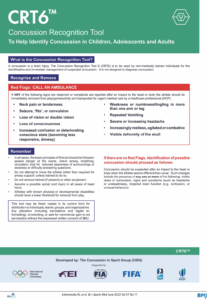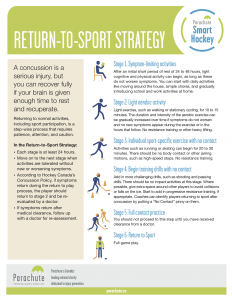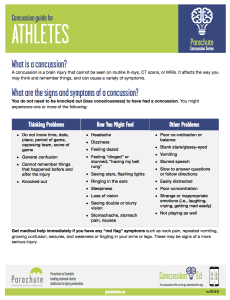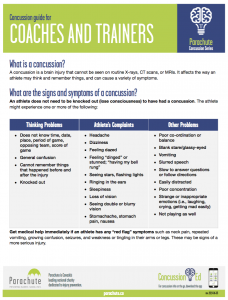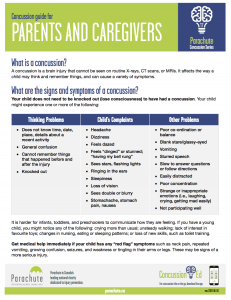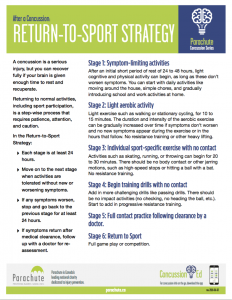The resources on this page will help sport organizations develop and implement evidence-based, best-practice concussion protocols based on the Canadian Guideline on Concussion in Sport. These resources are free to download and use.
Be sure to check if your National Sport Organization or your Provincial/Territorial Sport Organization has adopted a harmonized protocol.
Resources
Develop your concussion policy and protocol
-
Canadian harmonized sport concussion protocol template
This template provides an example of a concussion protocol that aligns with the Canadian Guideline on Concussion in Sport, 2nd edition.
364.42 KB Word
-
Canadian harmonized sport concussion protocol checklist
A tool to help you ensure your concussion protocol aligns with the Canadian Guideline on Concussion in Sport.
39.99 KB Word
-
Concussion Policy Development in Canadian Sport: A checklist for national sport organizations
Developed in collaboration with the Sport Information Resource Centre (SIRC), this resource will help you understand what components to include in a concussion policy to meet Sport Canada’s requirements.
-
Concussion Recognition Tool 6 (CRT6)
-
Child Sport Concussion Assessment Tool 6 (Child SCAT6)
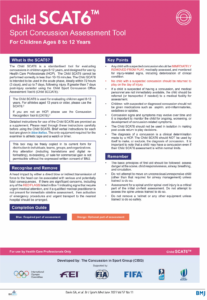
The Child SCAT6 is a standardized tool for evaluating concussions designed for use by licensed healthcare professionals. If you are not a healthcare professional, please use the Concussion Recognition Tool 6 (CRT6). The Child SCAT6 is to be used for evaluating children aged 8 to 12 years. For athletes aged 13 years and older, use the SCAT6.
-
Sport Concussion Assessment Tool 6 (SCAT6)
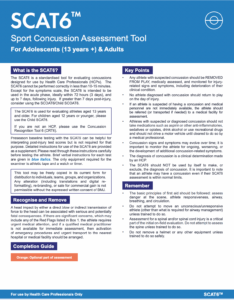
The SCAT6 is a standardized tool for evaluating concussions designed for use by licensed healthcare professionals. If you are not a healthcare professional, please use the Concussion Recognition Tool 6 (CRT6). The SCAT6 is to be used for evaluating athletes aged 13 years and older. For children aged 8 to 12 years, use the Child SCAT6.
-
Medical assessment letter
A medical assessment letter should be provided to athletes diagnosed with a concussion, indicating a concussion has been diagnosed. Athletes that are determined to have not sustained a concussion must be provided with a Medical Assessment Letter indicating a concussion has not been diagnosed and the athlete can return to school, work and sport activities without restriction.
29.82 KB Word
-
Medical clearance letter
Before returning to full contact practice and game play, each athlete must provide their coach with a standardized Medical Clearance Letter that specifies that a medical doctor or nurse practitioner has personally evaluated the patient and has cleared the athlete to return to sport.
27.78 KB Word
Create a sport-specific return-to-sport strategy
Tailoring activities to create a sport-specific strategy will help athletes return to your sport after concussion. Use the adaptation tool or sample strategies below, developed by Parachute, Parachute’s Concussion Expert Advisory Committee, and National Sport Organizations. Suggested activities in these strategies may need to be adjusted to ensure they are appropriate for the level of sport. Include the sport-specific strategy in your organization’s concussion protocol.
-
Sport-specific return-to-sport strategy adaptation tool
This tool will help ensure your Return-to-Sport Strategy is tailored to include sport-specific activities that help athletes return to your sport after a concussion.
44.01 KB Word
-
Alpine Ski Return-to-Sport Strategy
-
Artistic Gymnastics Return-to-Sport Strategy
-
Badminton Return-to-Sport Strategy
-
Canoe and Kayak Return-to-Sport Strategy
-
Cross-country Ski Return-to-Sport Strategy
-
Curling Return-to-Sport Strategy
-
Equestrian Return-to-Sport Strategy
-
Field Hockey Return-to-Sport Strategy
-
Freestyle Ski Return-to-Sport Strategy
-
Hockey Return-to-Sport Strategy (2025)
-
Judo Return-to-Sport Strategy
-
Nordic Return-to-Sport Strategy
-
Rugby Return-to-Sport Strategy
-
Sailing Return-to-Sport Strategy
-
Ski Jumping Return-to-Sport Strategy
-
Soccer Return-to-Sport Strategy
-
Volleyball Return-to-Sport Strategy
-
Water Polo Return-to-Sport Strategy
-
Wrestling Return-to-Sport Strategy
Implement your concussion protocol
Parachute and the Sport Injury Prevention Research Centre, University of Calgary, asked stakeholders from community up to high-performance sport about their experiences implementing concussion protocols. The resources below will help you address some of the common challenges identified.
Build awareness of your protocol
Everyone involved in your sport should be aware of your concussion protocol. Communicate openly about it and make it easy to find.
-
Improving Awareness of Your Organization’s Concussion Protocol: Strategies Checklist [word doc]
-
Concussion Protocol Summary Template [word doc]
Establish concussion education as a priority
Help everyone in your organization understand the importance of concussion education. Emphasize the benefits of being informed, and the potential consequences when you’re not.
-
Changing perceptions around the importance of concussion education
-
Changing perceptions around the importance of concussion education [word doc]
Build confidence to use the Concussion Recognition Tool 5
Teach coaches, volunteers, officials and parents/caregivers how to use the CRT5, to improve their confidence and ability.
-
Concussion Recognition Tool 5: Scenarios
-
Moderator Guide: Concussion Recognition Tool 5 (CRT5) Scenarios [word doc]
Improve communication between stakeholders
Facilitate communication between sport, home, school/work and health-care. Parents/guardians can play a key role connecting the various aspects of an athlete’s life and well-being.
-
Concussion Communication Tool [word doc]
Establish clear roles and responsibilities
National, provincial/territorial and community-level sport often work together to implement policies and protocols across the system. Ensure there is clear understanding of roles and responsibilities for all areas of your protocol.
-
Concussion Policy and Protocol Implementation Roles and Responsibilities Matrix Templates [word doc]
Build awareness
-
Pre-season concussion education sheet
Have all stakeholders review and sign this education sheet, at the time of sport registration or before the beginning of each sports season, to confirm that all participants received key information about concussion.
29.83 KB Word
-
Concussion Ed app
-
Concussion guide for athletes (2024)
-
Concussion guide for coaches and trainers (2024)
-
Concussion guide for parents and caregivers (2024)
-
Return-to-Sport Strategy (2024)
Webinar
-
Canadian Guideline on Concussion in Sport, 2nd edition webinar (2024)
The Canadian Guideline on Concussion in Sport, 2nd edition was published in March 2024 with updated recommendations for the prevention, recognition and management of concussions. This webinar will provide an overview of key changes to recommendations and highlight resources available from Parachute and its partners for concussion policy and protocol development, training and education/awareness.
Presenter: Stephanie Cowle, Director, Knowledge Translation, Parachute
Additional resources
Check out these resources from our partners.
-
Concussion Awareness Training Tool (CATT)
The Concussion Awareness Training Tool (CATT) is a series of free e-learning modules for different audiences: parents, coaches, athletes, educators, medical professionals, and those working with survivors of intimate partner violence.
-
Concussion resources – Sport Information Resource Centre
The Sport Information Resource Centre has a collection of information on concussion.
-
NCCP Making Head Way Concussion e
Learning Series 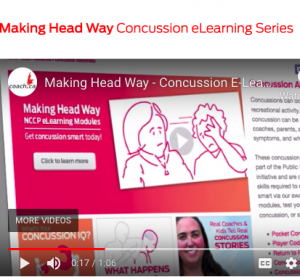
Designed to help you gain the knowledge and skills required to ensure the safety of your athletes, these National Coaching Certification Program (NCCP) Professional Development modules will make you concussion smart! Developed by the Coaching Association of Canada. Requires registration and takes 60 to 90 minutes to complete a module.
-
Concussion Awareness Week Toolkit
This toolkit was developed by the Federal-Provincial/Territorial Working Group on Concussions in Sport to support jurisdictions across Canada to implement activities during Concussion Awareness Week.
Injury Topics
Media
-
Link
NFL gives significant funding to help youth ‘SHRed’ the burden of concussion
University of Calgary — November 16, 2018
-
Link
How concussion research is changing university sports
Calgary Journal — October 24, 2018
-
Link
Former Crazy Canuck Podborski going full speed ahead on concussion management
The Star — October 21, 2018

